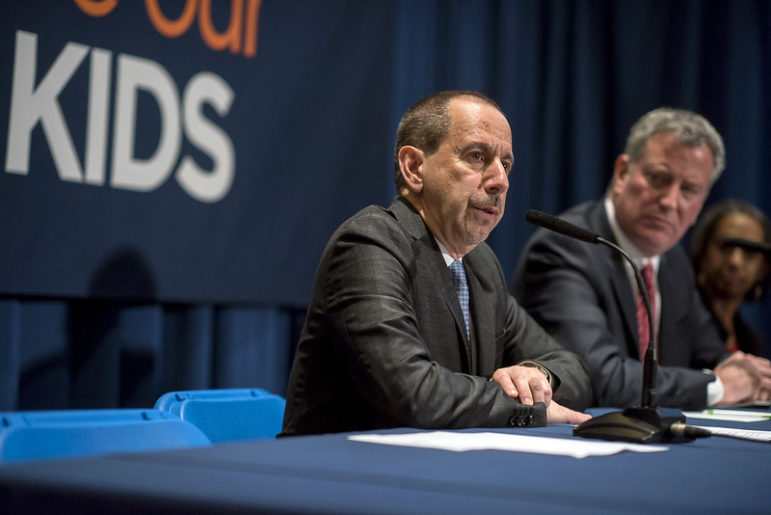‘Primary prevention—working with families further upstream to avoid child safety issues altogether—represents the future of child welfare services, but thus far the city is going it alone, with no financial support from the state or federal governments.’

Ed Reed/Mayoral Photography Office.
ACS Commissioner David Hansell, co-author, at an announcement with Mayor de Blasio in 2017.For the past three years, New York City has been investing in a new approach to reduce the likelihood that families will come into contact with the child welfare system. Through ‘primary prevention,’ the New York City Administration for Children’s Services (ACS) provides concrete support, resources and even social connections to families in need of some extra help. Now more than ever, as families across the city are feeling the stress caused by COVID-19 and the economic downturn, this ‘primary prevention’ child welfare approach has proved crucial. It has meant food, clothing and diapers for families. It has meant community connections for families feeling socially isolated. It has even meant emergency stipends for parents who lost their jobs.
This innovative approach builds on NYC’s longstanding commitment to ‘secondary prevention’ — services to families to address previously-identified safety risks to children while keeping them at home with their parents. These programs are critically important, and have kept thousands of children out of foster care. We believe that the extended reach to include primary prevention — working with families further upstream to avoid child safety issues altogether — represents the future of child welfare services, but thus far the city is going it alone, with no financial support from the state or federal governments.
In particular, through a primary prevention approach, New York City funds three Family Enrichment Centers (FEC), or walk-in community hubs, located in neighborhoods that have historically experienced high rates of reported child abuse and neglect. These centers are co-designed with the community and offer programs and support that families have requested. In addition to concrete resources, the centers offer Zumba classes, movie nights and other activities that help parents and children make friends. Notably, there is no state or federal support for this type of primary prevention program.
True to the FEC’s purpose and the grassroots infrastructure of each center, during the pandemic they have continued to be trusted and reliable hubs of support, and offered connections and resources without which families with children would have otherwise gone without. Our Family Enrichment Centers have offered virtual support to community members, including homework help for children. With the help of these centers, ACS was able to quickly identify some of the families hardest hit by the pandemic — those who got sick, lost their jobs, were in need of child care — and then provide them with emergency funds to help cover the costs of rent, utilities, food and other expenses.
Even prior to the pandemic, communities told us the Family Enrichment Centers were working. This summer, ACS released a report on the first evaluation of the Family Enrichment Centers and found that their offerings are having a positive effect on members’ social supports, family functioning, emotional connection with their children and outlook on life. Additionally, those surveyed reported significant increases in their access to advice and resources in addressing several life challenges including parenting, financial issues, relationships, food and nutrition issues and stress management.
During what has been a challenging and uncertain time for everyone, the Family Enrichment Centers have served as an important vehicle for families in need of extra support. New York State has long been generous in its support of our established prevention services, and under the new Family First Prevention Services Act, the federal government is finally stepping up to the plate and providing some — albeit limited — funding for those services. But programs like our Family Enrichment Centers remain ineligible for either state or federal funding, an enormous missed opportunity especially in the current crisis.
We have been through a difficult and painful period in New York City, but if there is a silver lining it is how much we can learn from the challenges we’ve experienced. As we look to build a post-pandemic world, we hope the federal government, and state governments, will fund programs that support families before life’s challenges get to be overwhelming.
David Hansell is commissioner of the city’s Administration for Children’s Services. Andrew Hevesi is the State Assembly member representing Queens’ 28th district.








